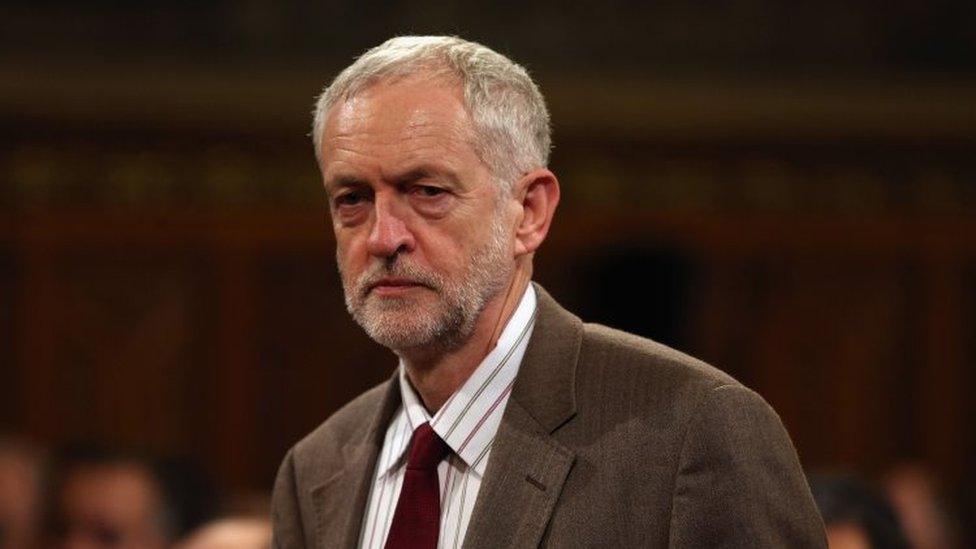Could Labour plotters oust Jeremy Corbyn as leader?
- Published
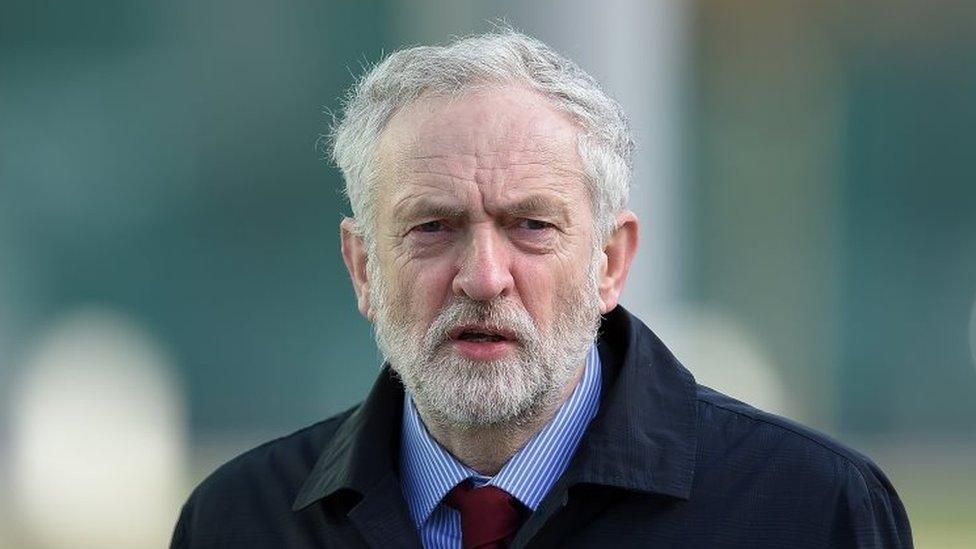
"We need to have more courage," a Labour MP, newly elected last year, confided to me in the corridors of Westminster.
"Lots of people are talking about a battle of ideas. But that can wait. There is nothing more important than ditching Jeremy Corbyn."
An ex-minister close to the former leader Gordon Brown was, in private, even more robust: "Labour is facing an existential threat.
"If Jeremy Corbyn leads us in to the 2020 election, it's all over for the party. We are screwed."
While some in the parliamentary party rail against their leader, others are more resigned to his continuation in office - and the consequences. A former minister close to another former leader - Tony Blair - declared: "I find a new reason to despair every day."
And some of their colleagues who attended a meeting of Labour's Parliamentary party on Monday night were incensed by reports of how the proceedings were briefed by Mr Corbyn's spokesman.
'Sea change'
He had characterised the meeting as marking the night the Labour mainstream sided with Jeremy Corbyn, who had faced down his internal opponents.
The leader had called for unity and told his MPs to stop "sniping" - and they in turn had tempered their criticism. There had been a "sea change in attitudes" said the spokesman.
Some of those present did not recognise this account and the "sea change" appears, in fact, to be a hardening of the attitudes of those who want Jeremy Corbyn ousted.
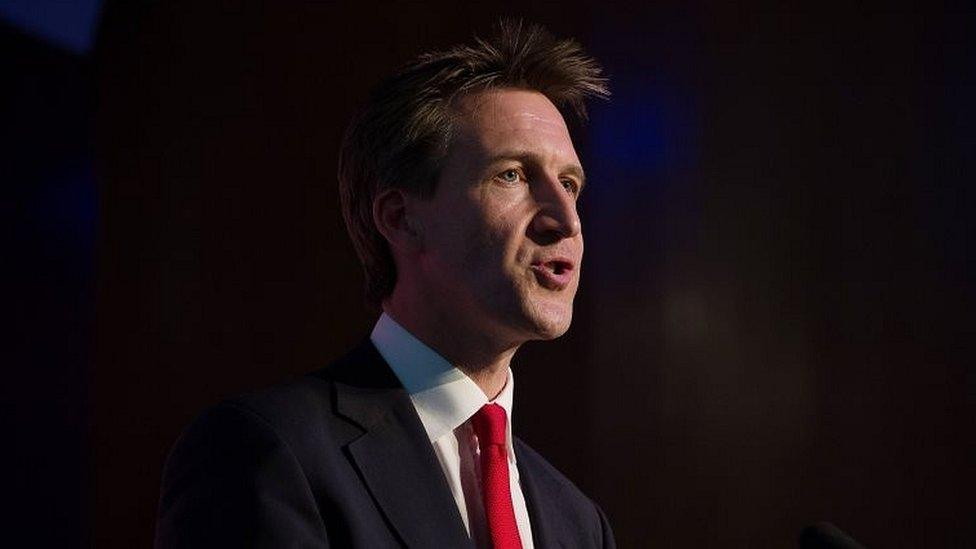
Barnsley Central MP Dan Jarvis is among those tipped as potential leaders
There has been a lot of shadow boxing between a Parliamentary Labour Party which overwhelmingly opposed Mr Corbyn's election as leader - and members and supporters who delivered it.
But now, at the very least, a minority of MPs seem more determined than ever to mount a challenge sooner rather than later.
The May elections in Scotland, Wales, London and English local authorities are set to be spun by Mr Corbyn's allies and critics alike.
At Monday's meeting the party leader refused to be drawn on how many council seats he expects to win (or lose).
That is meant to make it trickier for opponents to declare he has failed.
But party insiders believe 200 or more seats in England are vulnerable.
So the Corbynistas are responding in two ways.
'Good ground war'
The successor to the Corbyn leadership campaign - Momentum - will try to put well motivated activists into areas which are vulnerable.
With poor turnouts in many council contests, it's possible a good "ground war" could reap benefits and stem losses - or even lead to some unexpected gains. Momentum bussed supporters into the Oldham West by-election late last year.
The assumption was that Labour might just scrape home on a low turnout - in fact a relatively respectable 40% went to the polls, and Labour's vote share increased.
But even if council results turn out to be disappointing, the leadership are confident Sadiq Khan will defeat Zac Goldsmith in the London mayoral contest and that Labour won't slip to third place in Scotland.
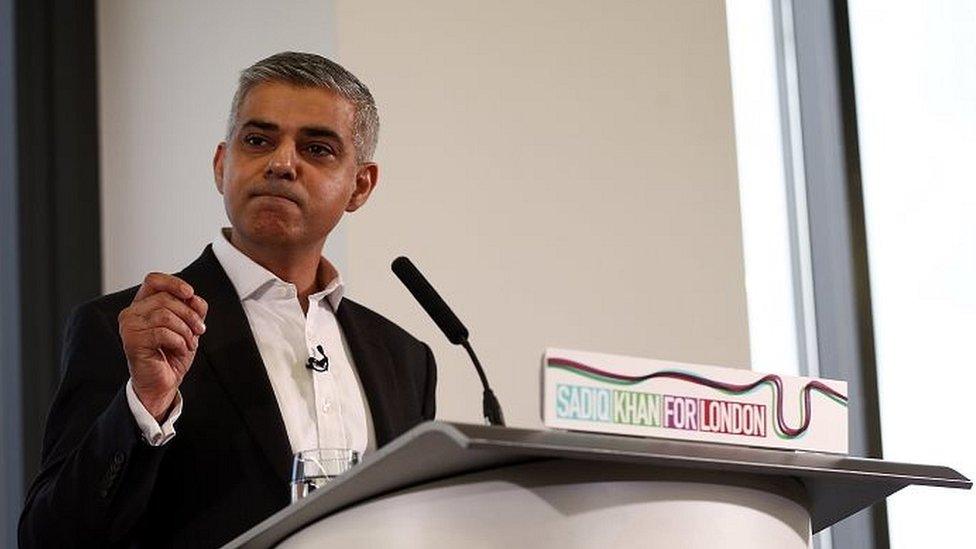
Labour expects Sadiq Khan to win in London
And this will be presented as proof that Jeremy Corbyn's leadership is far from toxic and he needs more time to mobilise further support for the party.
In this narrative, setbacks elsewhere will have been due to the Parliamentary "snipers" shooting their own leader in the foot.
On the other side, senior MPs are circulating a paper pointing out how well Labour should be doing at this stage in the electoral cycle.
It concludes that opposition parties have always gained seats over the past 40 years except in 1982 - when Labour was in opposition but suffered the SDP split - and in 1985 when the Militant Tendency and the miners' strike were in the headlines.
So some former ministers are likely to set targets of their own for Jeremy Corbyn - anything less than 300 gains will be denounced as unsatisfactory.
So let's assume - and this is not a prediction, just a scenario - that some Labour MPs will say Jeremy Corbyn has failed to clear the hurdles they have constructed for him. The rules are clear that it would take 20% of the combined total of Labour MPs and MEPs - 51 politicians - to trigger a leadership challenge.
Best opportunity?
But It's less clear if Jeremy Corbyn's name would then automatically be on the ballot.
The rule book here is open to interpretation.
One Corbyn opponent points out that when Tony Benn challenged the incumbent Neil Kinnock in the 1980s, the latter was required to gather nominations, too - and he says this would set a precedent.
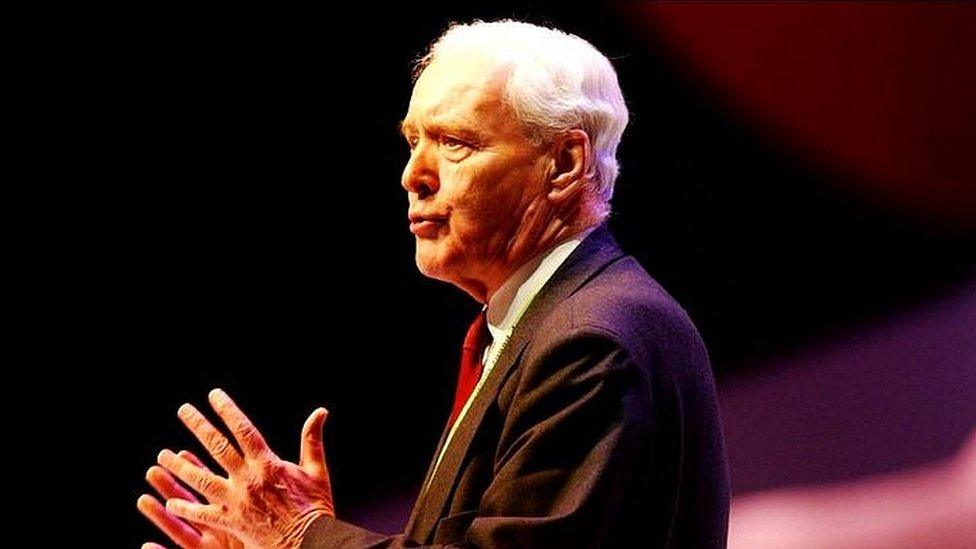
Tony Benn challenged Neil Kinnock in 1988
And Labour officials stress the importance of "custom and practice" when determining these issues.
That would mean Mr Corbyn would then have to gather 35 nominations from his fellow MPs to stand, if challenged.
He only gained that number last year because some of his Parliamentary colleagues wanted to "broaden the debate" and didn't expect him to win.
So it's possible he could be kept off the ballot. And that would be the best opportunity opponents would have to defeat him.
A YouGov poll of party members in February suggested if Jeremy Corbyn were on the ballot paper, he would win a leadership contest comfortably, with "soft-left" shadow foreign secretary Hilary Benn second, and ex-paratrooper Dan Jarvis - who gave a keynote speech on Thursday in which he denounced inequality and distanced himself, to a degree, from New Labour - narrowly behind in third place.
Genuine supporters
However, members were also shown a ballot paper without Jeremy Corbyn's name on it - and Hilary Benn, Tom Watson, Angela Eagle and Dan Jarvis were pretty much bunched together in that order.
So, unsurprisingly, Mr Corbyn's supporters in the Campaign for Labour Party Democracy are trying to make the rules less ambiguous - by getting the party's sovereign body, the annual conference, to agree that if challenged, the leader's name would automatically be on any ballot - and in future only 5%, not 15%, of MPs would need to nominate a candidate if Mr Corbyn were to stand down.
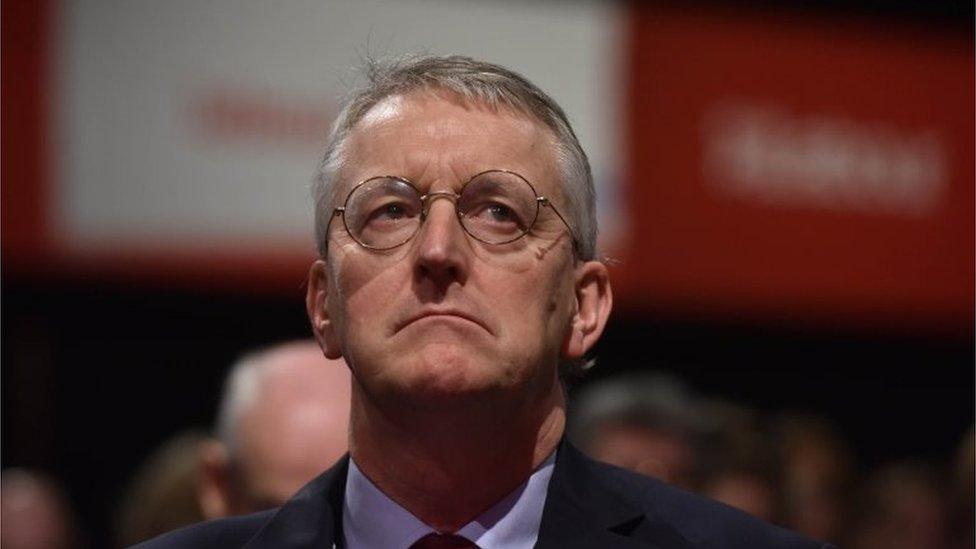
Hilary Benn is second choice among Labour members, a poll suggests
This would mean about a dozen MPs would have to give their backing. As Jeremy Corbyn had 14 genuine supporters in the Parliamentary party at last year's leadership contest, this lower threshold would mean a left-wing successor could not be blocked by their sceptical Parliamentary colleagues.
They would then put themselves before a membership whose centre of gravity is to the left of most Labour MPs for approval.
So that is why some of those who were close to either Blair or Brown believe it is worth trying to challenge the current leader before his position becomes more entrenched.
But despite all the talk about rules, privately the plotters believe that even if Mr Corbyn were required to seek nominations from fellow MPs to re-stand, due to a mixture of patronage and the fear of being deselected by new left-wing party members, it's perfectly possible that 35 MPs would support him this time in any case.
If so, any challenger would have their work cut out, according to that You Gov membership survey.
Roll of the dice
Two thirds of respondents said they wanted Jeremy Corbyn to lead Labour into the next general election. But crucially, asked if he should do so even if the May elections go badly for Labour, 53% of members would still want him to remain as leader until at least 2020.
So now there isn't just a division between most Labour MPs and their leader.
Amongst the non-Corbynistas, there are those that say it would be pointless to launch a leadership contest he is likely to win - and those who say they have to be seen to be making the argument that he is leading the party to disaster.
The mood between the two camps isn't quite as convivial as it once was.
A member of the latter group privately denounced the former as "collaborators". Members of this albeit fluid grouping - "there isn't a Committee to Get Rid of Jeremy Corbyn", said one MP - are coming to the conclusion that a leadership challenge is worth a roll of the dice.
But would Mr Corbyn simply fall on his sword if May's elections bring poor results?
'Wrong metric'
Some MPs say he isn't enjoying the job but a well-connected former Labour strategist is convinced he wouldn't step aside.
He says sections of the press - and Parliament - are "using the wrong metric to look at his success and failure".
He believes "those around him want to take on and change the party before thinking about trying to change the country - so winning elections isn't their priority".
So if he won't go of his own volition, July seems to be the likely time for a challenge.
As Dan Jarvis pointed out in his remarks to Westminster journalists on Thursday, Labour members and supporters would not forgive MPs who are not entirely focussed on May's elections and June's referendum.
But whenever a contest comes, Mr Corbyn's backers are confident he would win because the mood amongst the membership is against a return to "top down" politics and Parliamentary coups.
They don't buy the idea that, whatever the rules, it would be possible to exclude a leader who gained an overwhelming mandate just six months ago.
A leading light in Momentum put it like this: "They can challenge Jeremy if they want. Just so long as they know it would be a kamikaze operation."
- Published10 March 2016
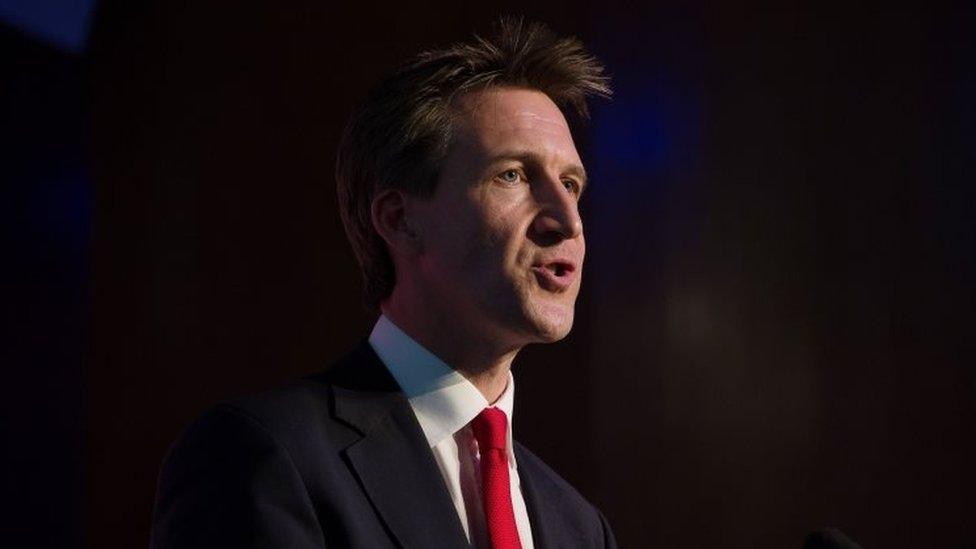
- Published20 November 2015
